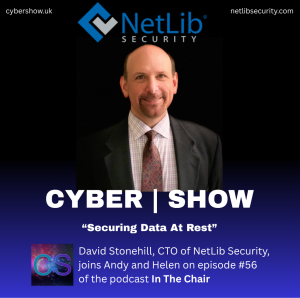NetLib Security on the Cyber Show Podcast: Encryption Is Not Optional
 On The Cyber Show podcast, NetLib Security CTO David Stonehill warns that only high-performance encryption can protect organizations against today’s risks and tomorrow’s challenges.
On The Cyber Show podcast, NetLib Security CTO David Stonehill warns that only high-performance encryption can protect organizations against today’s risks and tomorrow’s challenges.
On a recent episode of The Cyber Show’s podcast “In The Chair”, NetLib Security’s CTO, David Stonehill, discussed a wide range of issues facing the security industry, including encryption, the importance of protecting sensitive data, and the challenges of operating a business in an environment where the penalties for data breaches are inconsistently enforced or considered a cost of doing business.
NetLib Security has dealt with these considerations since its inception, and has evolved to handle the growth of connected devices and cloud computing that has left many companies vulnerable to an onslaught of ransomware and AI-fueled cyber crimes. From medical information to enterprise databases, all systems are targeted by hackers and thieves.
Host Andy Farrell and Stonehill noted usability and performance as especially important characteristics in any implementation. Software that is difficult to use or impacts responsiveness will be met with resistance, and the best encryption is the encryption you actually use, rather than a product that sits on the shelf.
With that in mind, NetLib Security offers transparent, filter-driven, easy to use, secure products that meet the modern day challenges facing firms that handle sensitive data. Future proofing against risks posed by the development of quantum computing was also discussed. Military grade, FIPS-compliant AES-256 encryption with complex keys is likely to prove unbreakable for the foreseeable future, but as Stonehill pointed out, the architecture of NetLib Encryptionizer allows the easy addition of new algorithms and key lengths – critical for the flexibility needed as technology evolves.
The interview also examined the impact of frequent data breaches upon the general public, and how users no longer trust organizations to safeguard their personally identifiable information. The consumer base finds itself with a pile of free credit monitoring offers in response to data breaches, rather than assurances that systems will be locked down. A skeptical public should demand tighter security according to Farnell and Stonehill, even if state and federal governments are unwilling or unable to enforce better standards.
In the end, they agree that encryption is a critical element that should be universally implemented. Companies will sometimes eschew encryption for concerns over price, complexity, or performance. NetLib Security’s goal is to promote the value of encryption: to show how solid encryption is easy to implement, to focus on quality user experience across all industries, and to keep it simple so that you can “set it and forget it.”
Press Release: Encryption Is Not Optional: NetLib Security Calls for Proactive Defense Against Data Breaches
Back to Basics Guide to Encryption FAQ:
Q: What is Transparent Data Encryption?
A: Transparent Data Encryption (TDE) is a method of encrypting stored data in database files on disk, capable of encrypting and decrypting without any modifications required to the application’s code. This provides an extra layer of security for when network defenses are breached.
Q: What is data at rest?
A: Data at rest, or stored data, is stored on physical or cloud systems, as opposed to data in motion or in use. A high value target for cyber criminals, it highlights the crucial need for encryption as a deterrent.
Q: What is the role of encryption in the healthcare industry/medical devices?
A: Sensitive patient data is an especially ripe target for hackers. The rise of connected medical devices used in hospitals and other healthcare facilities has only facilitated the ease with which patient data and medical records can be compromised. Strong encryption protocols can protect this data as well as ensure compliance with regulatory standards like HIPAA.
Q: What is the role of encryption in compliance laws like HIPAA?
A: HIPAA is the Health Insurance Portability and Accountability Act, enacted into US law in 1996 and establishes rules for covered healthcare providers, while ensuring rights and protections for patient health data. Numerous other data regulations have followed in recent years, such as GDPR and CCPA, aimed at enhancing consumers’ data rights. Part of these efforts often includes stipulations of data protection, a responsibility which falls to the covered entities; data encryption is the surefire way to meet these standards and avoid their penalties.
About NetLib Security
NetLib Security has spent more than 20 years developing a powerful, patented solution that starts by setting up a formidable offense for every environment where your data resides: physical, virtual and cloud. Our platform simplifies the process while ensuring high levels of security.
Simplify your data security needs. Encryptionizer is easy to deploy. It’s a cost-effective way to proactively and transparently protect your sensitive data that allows you to quickly and confidently meet your security requirements. With budget considerations in mind, we have designed an affordable data security platform that protects, manages, and defends your data, while responding to the ever changing compliance requirements. No coding changes required.
Data breaches are expensive. Security does not have to be.
NetLib Security works with government agencies, healthcare organizations, small to large enterprises, financial services, credit card processors, distributors, and resellers to provide a flexible data security solution that meets their evolving needs. To learn more or request a free evaluation visit us at www.netlibsecurity.com.
